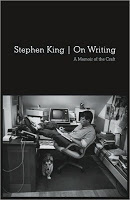January, a new year, time for making commitments and beginning anew. My ultimate goal for 2012 is to publish our follow up to
Depression Cookies
, but I need to jumpstart my writing after a holiday filled with children, festivities, friends, and fun, but little writing.
My goal most of last year was to read a writing craft book, and Stephen King's
On Writing came up time and time again. I had never read anything by King, but figured an author who had written over 50 books and sold millions must have something important to say. Because I'm easily terrified, King's books were never at the top of my to be readlist. He is now, for many reasons.

To start, I love the wayhis words seem to convey meaning with such ease. As I was reading about hisbackground and approach to writing, I felt like I was sitting next to him onthe front porch while he talked. His childhood was by no means easy, and hepoints out the effect it had on his writing. If I was a betting woman, I'd saythis book only scratches the surface of stories Stephen King could tell youabout his younger years.
But I didn't read this bookto find out more about Stephen King. I wanted to find out more about hisprocess as a writer. Turns out, his advice is simplebut crucial:
writers need to read, and read a lot, and they need to write. Hissuggestion: write 1,000 words a day. King states that he writes every day except forChristmas and his birthday, but quickly admits to writing even then. Everysingle day. It's a way of life for him. Even after his near-fatal accident, hewas back to writing, might even say it saved him.
He also emphasizes the needto understand and use correct grammar and punctuation. He illustrates this bydefining the essential tools in a writer's toolbox: vocabulary and grammar (he recommends
The Elements of Style by Strunk andWhite several times). I completely agree. Too often, a good story isovershadowed by horrible editing. At the end of the book he gives an example ofa piece and his edits. I will be referring to it often.
King said what I needed tohear to kickstart my 2012 writing, but don't read this for specific examples onhow to be a better writer. His second foreword clears that up right away: "Thisis a short book because most books about writing are filled with bullshit.Fiction writers, present company included, don't understand very much aboutwhat they do—not why it works when it's good, not why it doesn't when it'sbad."
I'll admit, I might be abit biased about this book. King declares, "You may wonder where plot is in allthis. The answer—my answer, anyway—is nowhere. I won't try to convince you thatI've never plotted any more than I'd try to convince you that I've never told alie, but I do both as infrequently as possible." I try to plot, truly I do, butI find myself drawn to just writing and seeing where the story leads me. King'swords comforted me—I have to be the writer I am.
I'll leave youwith King's words, "You learn best by reading a lot and writing a lot, and themost valuable lessons of all are the ones you teach yourself."
I highly recommend thisbook to several groups: people who love a good story, King devotees, andwriters looking for a kick in the butt, old-school style.
What craft book made you want to be a better writer?
 newest »
newest »
 newest »
newest »
 I think Ernest Hemingway's A Moveable Feast is a must read for aspiring writers. His prose itself is so wonderful, and while it is primarily a memoir, he does include some golden nuggets about the process of writing. Incidentally, when I picked it up, I thought it was fiction, so I was pleasantly surprised to learn it was his memoir.
I think Ernest Hemingway's A Moveable Feast is a must read for aspiring writers. His prose itself is so wonderful, and while it is primarily a memoir, he does include some golden nuggets about the process of writing. Incidentally, when I picked it up, I thought it was fiction, so I was pleasantly surprised to learn it was his memoir.
 I'll have to read that one. King was very inspirational, and I don't read King... yet. I have 11/22/63 tucked away but it's huge.
I'll have to read that one. King was very inspirational, and I don't read King... yet. I have 11/22/63 tucked away but it's huge.



